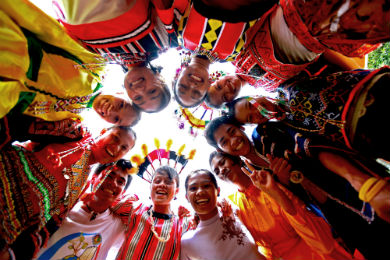
Of the seven billion people in the world today, approximately six billion are from the global South, largely Indigenous and living in poverty (Mignolo 2012). There is no doubt that this group of people will largely determine world futures, particularly given the changing nature of world environments, economics and politics. This rapidly changing world order requires a new order of global engagement around scholarship.
The network is composed of senior and junior scholars, and postgraduate students. All members seek to share and develop research outcomes that impact on Indigenous peoples in ways that support and promote the development of knowledges.
The multidisciplinary composition of the network is one of its strengths as it enables exchange around theoretical approaches, developing methodologies and empirical data. The key driver for the network is developing capacity to meet the challenge of Indigenous knowledge production.
Research includes:
- Facilitating the incorporation of Indigenous knowledges and research methodologies and practices into existing research programmes as a means of engaging with social justice issues, sustainable human relations and ecosystems.
- Mapping social and public policy in the context of Indigenous rights and wellbeing (especially those around health, the environment and land, and education).
- Engaging with Indigenous arts and material cultures, exploring innovative ways to protect and understand these works and repatriate intellectual property to Indigenous peoples.
- Analysing the continuing negative impact of colonialisms on Indigenous peoples and developing programmes of revival and policies to reverse the effects and practices of colonization and their ongoing contemporary manifestations.
- Analyzing Indigenous governance and economic systems in and across Asia, the Americas, the Pacific, Africa and Europe, as well as the strategies that Indigenous communities deploy to maintain or reinvigorate Indigenous self determination, considering how they achieve autonomy and/or express their own sovereignty.
- Considering Indigenous movements in the context of recognition, agency, identity, state building, economics and neo-liberalism. The focus is often on Indigenous peoples and development projects;
What links these projects together and provides the importance for this network is the focus on the social justice for Indigenous peoples through the incorporation of their knowledge production into the work of the academy.
Roundtable
In February 2015, the WUN Indigenous Research Network hosted a roundtable at the University of Sydney. Titled Approaching Indigenous research – ethics, protocols and the implications of collaborations, this workshop explored the issues of research between Indigenous and non-Indigenous scholars.
Selected outcomes
- Held first meeting titled “Approaching Indigenous Research: Ethics, Protocols and Collaboration” at the University of Sydney, February 2015.